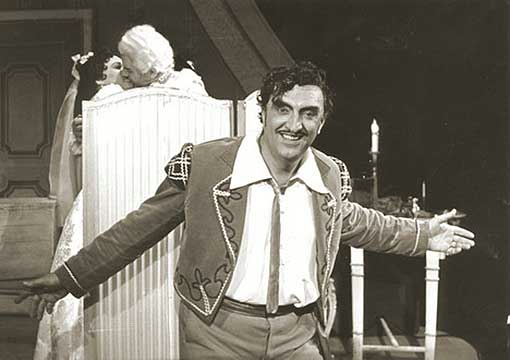On Saturday 21 March 1953 a group of players of the then Symphonic Orchestra of the Brno region with the conductor Waldhans set off to their traditional first spring walk after one of the rehearsals; they spent afternoon in the hills overlooking Královo Pole and were on their way back to Černá Pole, they made a lot of stops and tried to say goodbye many times but unsuccessfully. Finally, one of them remembered that two of their colleagues were playing in a home quartet at the Hrubeš family that evening; we rang the doorbell of their basement flat in Helfertova street before midnight and started to congratulate the famous opera singer on the first spring night. The quartet was on their way home with their instruments but Eduard found other instruments in his collection, distributed them among the new guests (Waldhans was given a wooden spoon) and he made the ensemble play the whole Eine Kleine Nachtmusik by Mozart.
The episode documents well how exceptional Eduard Hrubeš was among other opera solo vocalists of his calibre and his time. He studied to be a forest engineer, but he was endowed with uncommon general education and he never forgot his love of nature or ancient authors for his love of music, which made him study singing: in his talk shows which were part of his quartet evenings he contributed with unexpectedly interesting topics and wise sense of humour. As a quartet violoncello player he was famous for being a hoarder: his archive, which contained practically the entire repertoire, performed by household ensembles, i.e. from Haydn to Brahms, Dvořák and Tchaikovsky and he played it systematically and strictly, one piece after another, and he did not care about tired players who fiddled mechanically before midnight. Only one compositions – as a way to say goodbye – was always repeated: “The Hunt” quartet of Mozart, which he considered his own personal music portrait.
And there was even more which contributed to his forest image, i.e. his hunting dog called Alík, but everybody called him by a diminutive form Alíček, because he was a tiny dachshund with long silken fur; a very good-natured creature; seldom people heard him barking, he was welcoming quartet players with slight movement of his tail and when they started to play he curled up under the viola player’s chair and fell asleep. We had a discussion wondering if it was his favourite place in the room or whether he possibly liked the sound of viola. Once we changed the arrangement because of him and we started changing instruments too; the dog was not misled and each time found his way to the viola player – he showed more erudition than some diehard visitor of concerts who cannot tell the difference between violin and viola even after many years. Of course, we laughed at Eduard saying that his degenerated dog exchanged his hunting instincts for music education but Alíček outsmarted us once again: Each time the quartet went home at about midnight he went to his doghouse in the yard surrounded by a sturdy fence. Nobody knew that there was a small hole in the fence through which he went to gardens and yards nearby until he managed to steal in the henhouse of a local hen thief. After that he was forbidden to sleep in the doghouse, on the other hand he could enjoy the customary The Hunt quartet under the violinist’s chair once again played in his honour.
With his quartet interests and forest specialization Hrubeš was an exception among his colleagues at the theatre. And not only because of this: regional orchestra players liked him, he was their regular soloist of cantata performances because he never arrived unprepared for rehearsals and it was evident he knew what he was singing about –unlike many other opera singers who were used to learning their roles in an endless row of rehearsals and they only learnt their cantata or oratory performances during rehearsals with orchestra; the players then saw Hrubeš (and shortly after also Soňa Červená, who arrived in Brno at that time) as a very pleasant exception.
In the year of his double anniversary (in June it was a hundred year anniversary of his birth and in February thirty-five years from his death) we should commemorate at least the results of his main, i.e. opera performances in Brno: within these Biblical thirty-three years (between 1945 and 1978) he sang and played here (and his acting was far above the others) especially important baritone roles in nearly ninety productions; from his main roles, where he led the whole performance, e.g. Falstaff, Yevgeniy Onegin, Prince Igor, Jan Hus, Rigoletto, Gianny Schicchi, and Don Giovanni are probably still remembered by older audience, or Figaro in The Barber of Seville (where he accompanied himself with the guitar) or the Game Warden in The Cunning Little Vixen to name but a few. Once we talked about Janáček, his operas and the fact that there are many national artists or at least recognized artists, laureates of state, regional and other awards, Eduard said: I will never be awarded any prize, but sorry neither will you: you always somehow stand out inappropriately.
I do not remember the role he said goodbye with to his opera activities when he was sixty-four. But in his final performance the next year (it was The Opening of the Wells by Bohuslav Martinů in Ivančice) he sang in that beautiful baritone epilogue about himself: I have met spring… and the images of his beloved nature (flames of rowan berries blazing to the skies) he headed for the sweet end in As major and he handed over the heavy key, the key from home to the others. I felt I heard him for the last time; and I was right.































